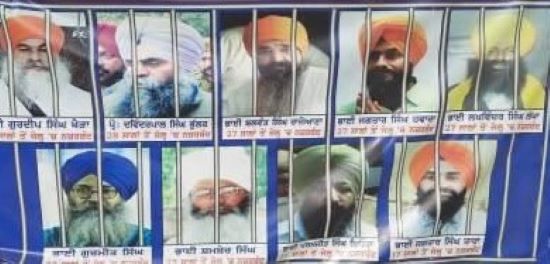 For decades, the protest to secure the release of Bandi Singhs has remained one of the longest-running struggles in Punjab’s modern history. These Sikh political prisoners, many of whom have completed their legal sentences or served far beyond the required time, continue to remain behind bars due to political hesitation and administrative delays. Their release has become a deeply emotional and moral issue for the Sikh community, pushing organisations, activists, and supporters across the globe to hold marches, sit-ins, hunger strikes, and continuous morchas to remind the government of its duty and the prisoners’ fundamental rights.
For decades, the protest to secure the release of Bandi Singhs has remained one of the longest-running struggles in Punjab’s modern history. These Sikh political prisoners, many of whom have completed their legal sentences or served far beyond the required time, continue to remain behind bars due to political hesitation and administrative delays. Their release has become a deeply emotional and moral issue for the Sikh community, pushing organisations, activists, and supporters across the globe to hold marches, sit-ins, hunger strikes, and continuous morchas to remind the government of its duty and the prisoners’ fundamental rights.
During the ten years when the Congress held power, both in Punjab and at the Centre, the issue largely remained frozen in files. Despite repeated appeals, memorandums, and public campaigns, the Congress governments did little beyond giving vague assurances. Committees were formed, delegations were met, and promises were made, but no decisive action was taken. Many Sikh groups accused the Congress of trying to avoid politically sensitive decisions, preferring silence over solutions. This decade is often remembered as one of polished indifference—there were sympathetic words, but no meaningful steps that could bring actual relief to the families waiting for justice.
The ten years of the Akali–BJP alliance brought a different kind of disappointment. The Akali Dal repeatedly claimed that the release of Bandi Singhs was its emotional and political commitment, often declaring that they were the true guardians of Sikh concerns. Yet, once in power, their loud speeches did not translate into results. Resolutions were passed in the Punjab Assembly, and high-profile meetings were held, but the alliance failed to use its influence in Delhi to push the BJP-led central government for final decisions. Critics accused the Akalis of playing double politics—raising the issue loudly in Punjab while remaining silent in Delhi to protect their relationship with the BJP. The result was another decade of missed opportunities.
Across these twenty years—ten under Congress and ten under the Akali–BJP alliance—the families of Bandi Singhs waited in pain as governments used the issue in speeches but avoided taking responsibility. Many of the prisoners qualified for release purely on administrative grounds, yet their freedom was delayed due to fear, politics, or neglect. This long pattern of broken promises created deep frustration among Sikh organisations and the wider community, who saw the issue being used more as political symbolism than a matter of human rights.
The protests continuing today are therefore not just demonstrations—they are a reminder of how successive governments have failed to act with courage and humanity. The demand to release Bandi Singhs is rooted in justice, emotion, and community faith. It stands as a continuous call to every government, regardless of party, to finally correct a long-standing injustice that has outlived multiple political eras.